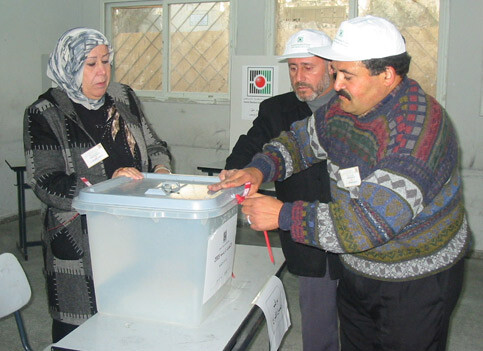
Members of the Central Elections Commission seal the empty ballot box in the early morning before the first voters arrive at a polling station in northern Gaza. (PCHR)
“It looks like Eid,” someone tells me. Indeed, it is a sunny day in the northern part of the Gaza Strip. In the early morning at some of the polling centers Gazans slowly show up. Members of the Central Election Commission are ready for the day. Boxes are sealed in front of the very few international observers in this part of the Gaza Strip. Local observers, including volunteers from various human rights organizations and party affiliates, are waiting to see what is going to happen.
“Abu Mazen rules,” says a teenager wearing a green cap showing the faces of Arafat and Mahmoud Abbas. He is standing in front of the polling center. “No, no, Barghouti is better,” says another campaigner. Although it is formally outlawed to campaign on election day, voters and some campaigners gather after they cast their vote outside the polling centers. They discuss the current situation in a friendly manner.
In the southern part of the Gaza Strip, the Israeli army briefly closed two checkpoints. Around 6,000 people live in Muwasi between the Gush Katif settlement bloc and the sea, but it was unclear how many were allowed from travelling to polling centers when the checkpoint was shut after voting began at 7:00 am. At noon we heard that some could enter and that a few international observers were allowed. Another checkpoint at Abu Gholi to the north was closed for an hour before being re-opened.
At the border between Egypt and Rafah some 7,000 Palestinians wait to enter the Gaza Strip. They haven’t been allowed to enter the Gaza Strip. The Central Election Commission said today that Israel has not facilitated the movement of Palestinians in the West Bank during the ongoing Palestinian presidential election. Israeli checkpoints still exist and the Israeli army did not withdraw from the West Bank as Israeli authorities had said. Voters moved slowly, because Israeli troops went through them at checkpoints.
In East Jerusalem only a small fraction of the 160,000 eligible voters were allowed to cast their votes at the five post offices. The vast majority of Jerusalem’s voters were forced to travel to polling centers outside the city. Inside the 1,077 polling centers in the Gaza Strip, the West Bank and East Jerusalem, no illegal practices are seen.
In Tulkarem four polling centers did not open as scheduled due to Israeli closures. Israeli soldiers closed the Annaba checkpoint, preventing Palestinian voters from heading to cast their votes.
Inside the polling centers, party affiliate observers pay close attention to proceedings. In some polling centers observers of Barghouti’s campaign sit side by side observers of Fatah’s Mahmoud Abbas or DFLP’s Tayseer Khaled.
In Beit Hanoun one local party observer affiliated with Hamas was checking the fairness of the elections. He showed me his thumbs. They were clean of any ink, which staff from the Election Commission puts on the thumbs of voters after they cast their vote.
“No,” he said, “I’m not voting, but I’m here as an observer. The party I represent is preparing for the parliamentary elections in July.” Asked whether he noticed any problems with the voting, he said that even some people he know who are affiliates with Hamas casted their vote. He thought that they either would cast a blank ballot or vote for any of the opposition candidates.
Related Links
Arjan El Fassed is co-founder of The Electronic Intifada and currently for in the Gaza Strip as part of UCP’s election monitors, accredited as an international election observer.


